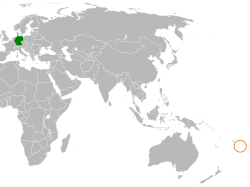History
In the 19th century, German settlers migrated to Tonga. They were relatively few in number, and were distinct from other German settler communities in the New World in their proportionally high, fast and near complete assimilation into the local culture.
In 1876, Germany signed a treaty of friendship with Tonga, [4] [5] and leased space for a coaling station at Neiafu in Vavaʻu. [6] The political background of the Treaty of Friendship of 1876 was the heyday of imperialism and colonialism in the Pacific Islands. [7] During this phase, various great powers (including the German Empire) fought over the division of the region. [8] In 1878 Emperor Wilhelm I sent King George Tupou I a life-sized portrait of himself. [9] This was followed in 1879 by awarding him the Order of the Red Eagle. [10] In the Samoa Treaty of 1899, Germany recognised the Tonga Islands as part of Britain's sphere of interests. In 1900, Tonga became a British protectorate, and Germany's rights were ceded to Britain. [11] During World War I, New Zealand recruited Tongans to fight Germany in the New Zealand Expeditionary Force. [12]
Germany showed a renewed interest in Tonga in 1976, when the Soviet Union proposed establishing a base there, [13] and re-establishing diplomatic relations, [14] renewing the Treaty of Friendship, and granting bilateral aid for the first time. [15]
This page is based on this
Wikipedia article Text is available under the
CC BY-SA 4.0 license; additional terms may apply.
Images, videos and audio are available under their respective licenses.


